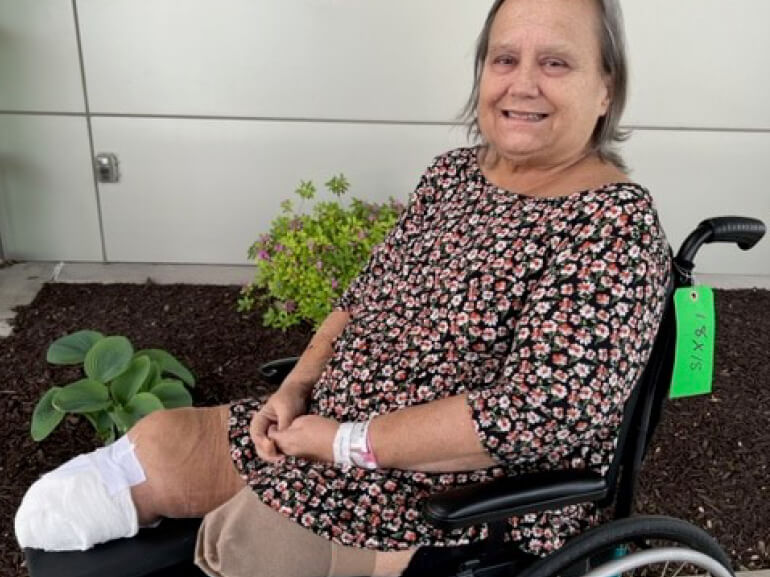Karen’s story

When Karen Milburn, a 66-year-old quality assurance engineer from Waterloo, Illinois, began to experience pain in her right foot that she described “like firecrackers going off,” she headed straight to the emergency room at Mercy Hospital.
Karen has managed a number of health challenges over the years, including diabetes, diastolic heart failure and chronic kidney disease, which requires dialysis. In addition, she had an above the knee amputation – the result of complications from her chronic health conditions. Married for 46 years, sharing three children and four grandchildren with her husband. She cherishes time spent with her family and enjoys outdoor activities, especially in warm weather.
After undergoing testing at the hospital, she was diagnosed with ischemia of her right foot, or when there is an inadequate blood supply that restricts oxygen and nutrients that can result in loss of regular function. Without hope of improvement because of her health conditions, doctors recommended that Karen have her right leg amputated below the knee.
Now living as a double amputee, Karen struggled to do nearly everything without assistance because of her inability to transfer, or move from one surface to another, independently. Dependent on a mechanical lift to get her out of bed and into a wheelchair, Karen required close supervision and tired easily when trying to propel herself. Her case manager at Mercy Hospital recommended inpatient rehabilitation at SSM Health Rehabilitation Hospital – Bridgeton as the next step in her journey.
Upon admission, Karen’s goals were to regain independence in order to alleviate the burden on her family, particularly her husband, who works during the day. The skilled and compassionate physician-led team of nurses and therapists were determined to help her achieve these objectives. Physical therapy focused on improving Karen’s mobility and strength. Because of her double leg amputations, they emphasized building strength in her arms and core to support her ability to transfer. They also focused on improving her balance to help her complete her self-care activities without the risk of falling.
Physical therapists also arranged for an ultra-light wheelchair making it easier and less fatiguing for Karen to move around. To further boost her comfort, Karen’s team sourced foam fingertips and gloves, to help her hands and fingers while using the wheelchair.
Occupational therapy worked to increase Karen’s independence and endurance. Therapy sessions focused on strengthening her core to improve her balance while sitting and reaching for items when she returned home. Occupational therapists also taught Karen techniques to reduce pressure on her lower body – showing her how to shift her weight so that she could avoid developing pressure sores that can develop from sitting in one place for long periods.
Another form of relief came in the form of a Beasy board. Karen’s therapists introduced her to the portable, gliding swivel seat that made for easy transfers. It was a game changer for Karen. Though initially afraid of falling, occupational therapists showed her how to use yoga blocks for additional support and balance. Karen’s husband and family were often on hand for therapy sessions – taking part in the hospital’s Care Partner program, which prepared them to support her when she returned home.
“Working with Karen has been a joy,” her therapists said. “One of Karen’s strengths is a willingness to try new things that may have initially been outside of her comfort zone. Seeing her confidence grow during her time in rehab was inspiring to witness.”
Karen immersed herself in therapy because she wanted to become independent, but also because she enjoyed the activities, especially group therapy sessions, trivia and navigating an obstacle course in her wheelchair while working on her balance and upper body strength.
After 27 days at SSM Health Rehabilitation Hospital – Bridgeton, Karen had made amazing progress. She was able to wheel herself more than 500 feet over a variety of indoor and outdoor surfaces, transfer herself with ease and independently bathe and dress herself. Karen said she was ready to go home and sleep in her own bed. She plans to continue building on her rehabilitation with outpatient therapy.
When asked about the advice she would offer to others facing similar challenges, Karen emphasized the importance of maintaining a positive attitude, being open to suggestions and involving family in the recovery process.